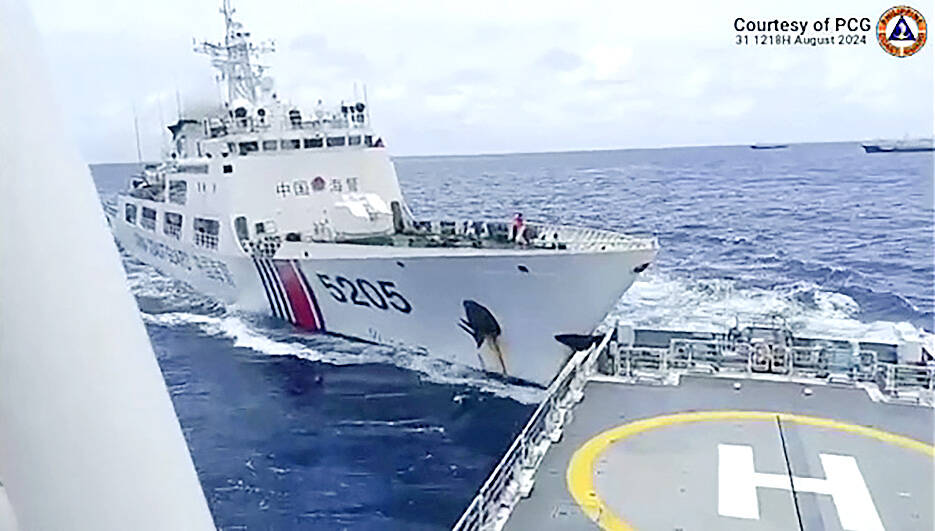A senior US military official yesterday warned his Chinese counterpart against Beijing’s “dangerous” moves in the South China Sea during the first talks of their kind between the commanders.
Washington and Beijing remain at odds on issues from trade to the status of Taiwan and China’s increasingly assertive approach in disputed maritime regions, but they have sought to re-establish regular military-to-military talks in a bid to prevent flashpoint disputes from spinning out of control.
Samuel Paparo, commander of the US Indo-Pacific Command, and Wu Yanan (吳亞男), head of the People’s Liberation Army (PLA) Southern Theater Command, talked via videoconference.

Photo: AFP / Philippine Coast Guard
Paparo “underscored the importance of sustained lines of communication between the US military and the PLA,” a statement from his command said.
“Such discussions between senior leaders serve to clarify intent and reduce the risk of misperception or miscalculation,” he said.
He also raised “unsafe interactions with US allies” by the Chinese side.
Paparo “urged the PLA to reconsider its use of dangerous, coercive, and potentially escalatory tactics in the South China Sea and beyond,” the statement said.
Wu’s Southern Theater Command is responsible for the Beijing military’s activities in the South China Sea, where Chinese vessels have engaged in a series of high-profile confrontations with Philippine ships.
China claims almost all of the economically vital body of water despite competing claims from other nations and an international court ruling that its assertion has no legal basis.
Beijing this month said that it was defending its “rights” in the waters, after the Philippines released footage appearing to show a China Coast Guard vessel ramming one of its ships during an at-sea confrontation.
Beijing’s readout of the talks said that Wu held “an in-depth exchange of views” with his US counterpart.
The two officials discussed “issues of common concern,” it added.
The talks were the first of their kind since China scrapped military communications with the US in 2022 in response to then-US House of Representatives speaker Nancy Pelosi’s visit to Taiwan.
Yesterday’s high-level military dialogue between the geopolitical rivals comes on the heels of the first visit to China by a top White House aid since 2016.
US National Security Adviser Jake Sullivan visited Beijing last month, where he held talks with senior army official Zhang Youxia (張又俠).
Sullivan’s meeting with Zhang saw the officials agree to hold a call between the two sides’ theater commanders, the White House said.
The top aide also raised the importance of “freedom of navigation” in the South China Sea and “stability” in the Taiwan Strait, Washington said.
Zhang, in turn, warned that the status of Taiwan was “the first red line that cannot be crossed in China-US relations.”
“China demands that the US halts military collusion with Taiwan, ceases arming Taiwan and stops spreading false narratives related to Taiwan,” Zhang said.
He also asked the US to “work with China to promote communication and exchanges between the two militaries and jointly shoulder the responsibilities of major powers.”

Taiwan is gearing up to celebrate the New Year at events across the country, headlined by the annual countdown and Taipei 101 fireworks display at midnight. Many of the events are to be livesteamed online. See below for lineups and links: Taipei Taipei’s New Year’s Party 2026 is to begin at 7pm and run until 1am, with the theme “Sailing to the Future.” South Korean girl group KARA is headlining the concert at Taipei City Hall Plaza, with additional performances by Amber An (安心亞), Nick Chou (周湯豪), hip-hop trio Nine One One (玖壹壹), Bii (畢書盡), girl group Genblue (幻藍小熊) and more. The festivities are to

Auckland rang in 2026 with a downtown fireworks display launched from New Zealand’s tallest structure, Sky Tower, making it the first major city to greet the new year at a celebration dampened by rain, while crowds in Taipei braved the elements to watch Taipei 101’s display. South Pacific countries are the first to bid farewell to 2025. Clocks struck midnight in Auckland, with a population of 1.7 million, 18 hours before the famous ball was to drop in New York’s Times Square. The five-minute display involved 3,500 fireworks launched from the 240m Sky Tower. Smaller community events were canceled across New Zealand’s

‘IRRESPONSIBLE’: Beijing’s constant disruption of the ‘status quo’ in the Taiwan Strait has damaged peace, stability and security in the Indo-Pacific region, MOFA said The Presidential Office yesterday condemned China’s launch of another military drill around Taiwan, saying such actions are a “unilateral provocation” that destabilizes regional peace and stability. China should immediately stop the irresponsible and provocative actions, Presidential Office spokeswoman Karen Kuo (郭雅慧) said, after the Chinese People’s Liberation Army (PLA) yesterday announced the start of a new round of joint exercises around Taiwan by the army, navy and air force, which it said were approaching “from different directions.” Code-named “Justice Mission 2025,” the exercises would be conducted in the Taiwan Strait and in areas north, southwest, southeast and east of Taiwan

UNDER WAY: The contract for advanced sensor systems would be fulfilled in Florida, and is expected to be completed by June 2031, the Pentagon said Lockheed Martin has been given a contract involving foreign military sales to Taiwan to meet what Washington calls “an urgent operational need” of Taiwan’s air force, the Pentagon said on Wednesday. The contract has a ceiling value of US$328.5 million, with US$157.3 million in foreign military sales funds obligated at the time of award, the Pentagon said in a statement. “This contract provides for the procurement and delivery of 55 Infrared Search and Track Legion Enhanced Sensor Pods, processors, pod containers and processor containers required to meet the urgent operational need of the Taiwan air force,” it said. The contract’s work would be